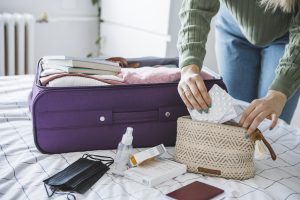 The holiday season is one of the busiest times for airplane travel. The Transportation Security Administration (TSA) recently shared that it expects almost 40 million people to fly this year. Among those travelers are people who need to pack their prescriptions for their trips.
The holiday season is one of the busiest times for airplane travel. The Transportation Security Administration (TSA) recently shared that it expects almost 40 million people to fly this year. Among those travelers are people who need to pack their prescriptions for their trips.
Each country has rules for what is permissible or legal. Therefore, it is important to check with your destination’s embassy and learn the laws when flying with your prescriptions.
For those traveling to and from the United States, TSA provides the following information:
- It is not necessary to present your medication to or notify an officer about any medication you are traveling with unless it is in liquid form (See next bullet).
- Medication in liquid form is allowed in carry-on bags in excess of 3.4 ounces in reasonable quantities for the flight. It is not necessary to place medically required liquids in a zip-top bag. However, you must tell the officer that you have medically necessary liquids at the start of the screening checkpoint process. Medically required liquids will be subject to additional screening that could include being asked to open the container.
- You can bring your medication in pill or solid form in unlimited amounts as long as it is screened.
- You can travel with your medication in both carry-on and checked baggage. It’s highly recommended you place these items in your carry-on in the event that you need immediate access.
- TSA does not require passengers to have medications in prescription bottles, but states have individual laws regarding the labeling of prescription medication with which passengers need to comply.
- Medication is usually screened by X-ray; however, if a passenger does not want a medication X-rayed, he or she may ask for a visual inspection instead. This request must be made before any items are sent through the X-ray tunnel.
- Nitroglycerin tablets and spray (used to treat episodes of angina in people who have coronary artery disease) are permitted and have never been prohibited.
Packing your medications safely and according to TSA guidelines can help avoid delays during airport security screenings. Remember to check the laws on medications for your destination; some medications that are considered legal in the U.S. may be unlicensed or classified as controlled substances in other countries.
For more information on TSA medication guidelines, please visit https://www.tsa.gov/
All content of this newsletter is intended for general information purposes only and is not intended or implied to be a substitute for professional medical advice, diagnosis or treatment. Please consult a medical professional before adopting any of the suggestions on this page. You must never disregard professional medical advice or delay seeking medical treatment based upon any content of this newsletter. PROMPTLY CONSULT YOUR PHYSICIAN OR CALL 911 IF YOU BELIEVE YOU HAVE A MEDICAL EMERGENCY.
